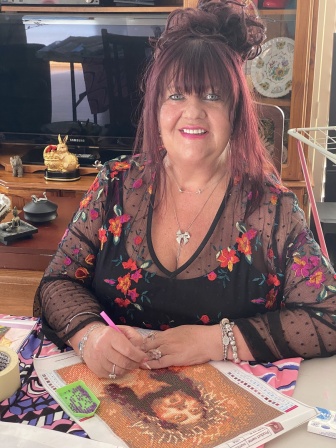A little over a year ago, Kerri Nolte had sunk to the depths of her despair.
She had night terrors and couldn’t sleep. She couldn’t leave her house and could barely leave her bed. And she didn’t know where to turn for help.
“I hadn’t left the house in years, I couldn’t walk to the letterbox; everything outside my door was scary. I stayed in bed, curled up in a foetal position and could hardly move,” she said.
And then a friend suggested Kerri join the NDIS.
“I didn’t know about the NDIS, I was just a mess, but a girlfriend said you should be on this, and thank God I found it because I would be dead now, there’s no question, and my whole family would be destroyed,” said Kerri, who lives in Pakenham, Victoria.
Kerri, 56, lives with debilitating anxiety, depression, post-traumatic stress disorder and bipolar disorder. She has often been hospitalised in life-threatening situations.
Kerri says her illness has been affected by several traumatic events, including separation from a parent and sibling as a young child, sexual abuse and domestic violence.
She says she survived by living a life of fantasy and hiding her illness. For many years, she has been dangerously unwell, isolated, and unable to function in society.
But now, with NDIS supports in place, Kerri is on a path to recovery.
She is sleeping better, meditating, and sees a positive future for herself. She enjoys diamond painting, which is helping her to improve her mental health.
And she wants to share her experiences to help others.
“I’ve gone from feeling like I was in a coma, a coma of trauma, to feeling a pulse, to having a heartbeat, to wanting to live,” said Kerri.
“I know I’m not cured—I’ve got a life sentence—but I’m learning to live with it and manage it because of my supports and because the NDIS is helping me.”
Kerri’s NDIS plan provides her with support workers who come to her home, a mental health occupational therapist, and a support coordinator, who has helped her to find the supports she needs.
The NDIS continues to help Kerri during Melbourne’s Stage 4 lockdown. As essential service workers, Kerri’s support workers can enter her home whenever she needs them.
Kerri says her support coordinator Kerrie Hart, of Hart to Hart Counselling.is ‘amazing and someone who goes above and beyond and really cares’.
She says before COVID, her mental health had improved enough to do grocery shopping and go for walks with support workers.
During the first lockdown in March, Kerri was able to use her NDIS plan to buy an iPad, which she uses to manage her plan and access Telehealth appointments.
She says she enjoys feeling in charge of her NDIS support and having choice and control over which support workers she allows into her home and how she uses her funds.
“It makes you feel important, I am CEO of the Kerri Nolte NDIS plan,” she said. “It makes me so excited, I’m beaming.”
Kerri says she wants to help others and hopes to one day volunteer and possibly have a paid job, helping people recover from trauma.
“I’d like to help others not to suffer and to educate other people,” she said.
“Having an invisible disability is so hard. I used to always pray there was somewhere that someone like me could go and feel safe. It was the NDIS that saved me.”
Source: NDIS Stories

